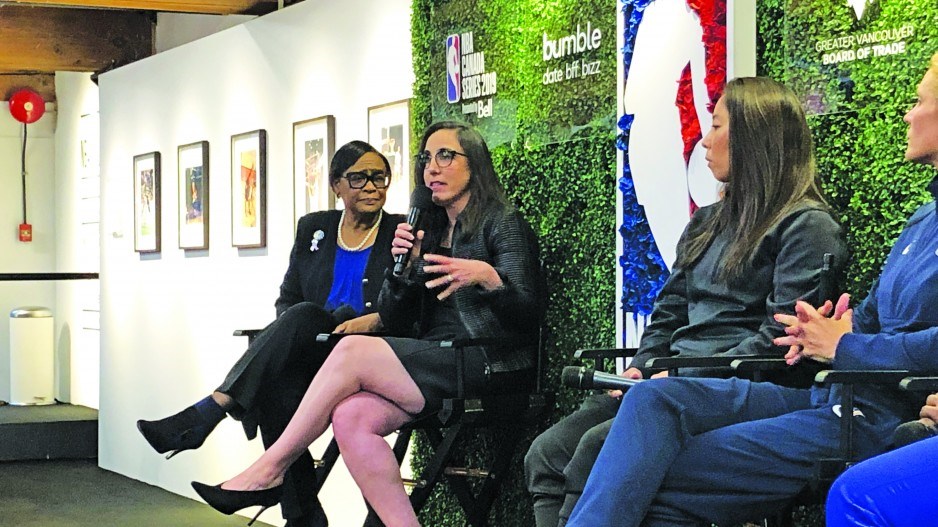The National Basketball Association (NBA) and its teams take their social values everywhere they go around the world – even if they don’t engage on certain issues because officials “don’t know all the details” – a top team executive said in Vancouver this month.
Dallas Mavericks CEO Cynthia Marshall was in B.C. on October 17 alongside Gillian Zucker, president of business operations for the Los Angeles Clippers, to speak at the Greater Vancouver Board of Trade’s “The Modern NBA: Power, Progress and Responsibility” event.
While the conversation focused on the efforts of Marshall and Zucker – two of the first senior-level women executives in NBA history – in promoting gender equality, diversity and inclusion within the league, the topic invariably touched on the recent firestorm of criticism levelled at the NBA for its handling of China’s response to one team executive tweeting his support for the Hong Kong pro-democracy protests.
When asked about the NBA’s role in promoting social change (in addition to extending its business reach) globally, Marshall – a former long-time senior executive with telecommunications giant AT&T (NYSE:T) – said she is proud to be part of a league that first played an exhibition game in China in 1979.
“We take our values everywhere we go,” Marshall said. “And we are about equality. We are about respect. That travels with us, even when we don’t know the details and we don’t engage, those values travel with us.”
The firestorm started in early October, when Houston Rockets general manager Daryl Morey tweeted his support for pro-democracy demonstrations in Hong Kong that have spurred increasing violence from police and others within the former British colony now administered by China.
Beijing quickly cut ties with the league, leading to what NBA commissioner Adam Silver called “fairly dramatic” financial consequences.
Meanwhile, responses from star players such as LeBron James – who called Morey “misinformed” – drew heavy criticism in North America, where fans and government officials expressed concerns about western businesses like the NBA deferring to Beijing’s demands on issues the Chinese government deems non-negotiable.
For Marshall, a high-profile 2018 hire by Mavericks owner Mark Cuban after a lengthy investigation found numerous cases of sexual harassment and improper conduct within the team’s business operations, the vocal nature of NBA teams on social issues in United States and its mixed messages in China do not present a double standard.
“When you think about the fact that we are global, we get involved in foreign issues, and we get involved in domestic issues,” she said. “Obviously, we tend to speak out and take a stand on domestic issues because some foreign issues, we just don’t have enough knowledge on.”
Zucker did not respond to the question of the NBA’s handling of the China issue. Instead, the Clippers executive focused on the team’s efforts to be more community-friendly and inclusive. Those efforts include a new initiative to set aside 50 to 200 tickets every home game this season for $10 each to open up the NBA experience to fans who can’t afford tickets.
Regarding the NBA’s ongoing efforts to diversify its workforce and encourage inclusion, both Zucker and Marshall said challenges remain. They noted that some people continue to view the efforts as being quota-based and taking opportunities away from qualified Caucasian men.
But the two said such views are ridiculous, because NBA teams can’t afford to hire someone who isn’t good at his or her job.
“We have jobs to do,” Marshall said. “I was mistaken at a game for being an usher. Somebody asked me to take them to their seats. You know what I did, though? I took them to their seats. Because, you know what? These are my season-ticket holders … And so, when I found the seats, I said, ‘Do you need anything else? Maybe I can get you some water? Because I’m taking care [of you].’ I’m trying to put 19,200 people in seats 41 times a year. I have a business to run.”




